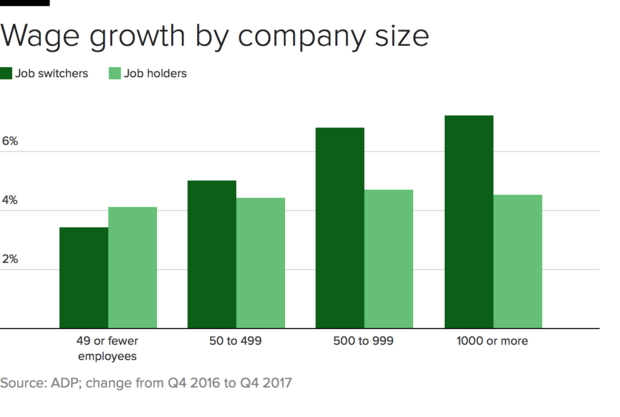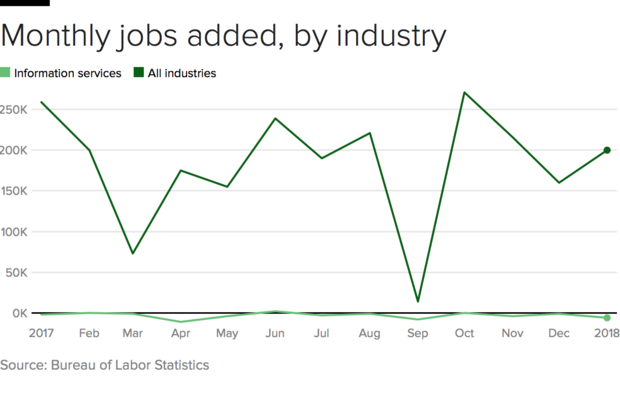Wage growth: Why some American workers aren't benefiting
Americans' paychecks are finally kicking into high gear, with the January jobs report showing the strongest wage growth since 2009. Yet not every type of worker is benefiting.
Workers saw average hourly wage growth of 2.9 percent in January, the strongest in eight years, the Labor Department said earlier this month. While businesses routinely cite hiring and retaining employees as among their biggest challenges, the majority handed out pay increases of 3 percent or less, according to a recent PayScale report. Some part-time workers at large firms actually saw earnings drop last year, data from payroll processor ADP show.
So what's happening? Wages increasingly reflect societal divisions, with a select few highly paid employees pulling up the overall pay data, say analysts and economists.
Here are the workers who are disproportionately benefiting from the tight labor market.
Employees who decamp for large companies
The biggest gains are going to workers who jump ship for new jobs, payroll processor ADP said. That holds especially true for workers joining large companies with more than a thousand employees.
In the latest quarter, full-time workers who switched to jobs at the country's largest businesses saw an average pay hike of 7.2 percent, ADP found. Job-hoppers to companies with 500 to 999 workers enjoyed a slightly smaller wage increase, at 6.8 percent. But workers in their jobs for a year or longer saw smaller increases.
Large companies have the resources to spend on hiring and raises. When competition heats up, they have the flexibility to boost pay or introduce perks and benefits, which also cost money.
"It's much tougher for the smaller companies," said Ahu Yildirmaz, head of the ADP Research Institute.
Managers and supervisors
Wages for the rank-and-file fell short of January's average pay hike. Yet managers received more generous raises, pulling the overall figure up. Supervisors' wages have posted year-over-year growth between 3 and 4 percent, according to Pantheon Macroeconomics, which predicts a continuation of stronger growth for supervisors.
"[W]e think the trend in supervisory/non-production workers' wage gains will run close to February's pace, at about 4 percent," chief economist Ian Shepherdson wrote in a note. "The message here is that higher-skilled people have retained much of their bargaining power in the wake of the 2008 crash, while the lower paid have not."
Tech is king
Those in search of strong wage growth should consider the information sector, which includes the technology industry. Ironically, the sector lost jobs last year partly because of a labor shortage, which is pushing up wages as companies compete for scarce talent.
"In information, there's been no job growth but the wages are growing," said Yildirmaz. "It means there are jobs, but there are no newcomers to fill those jobs. So [companies] hire from each other."
Workers in the information sector received the highest increases in nearly any sector in ADP's data. Those who held their jobs for more than a year saw wage growth of 5 percent, while job-switchers saw a 6.2 percent increase.
The only sector with faster pay growth was leisure and hospitality, where those switching jobs saw a 6.3 percent boost. However, that increase comes off a much smaller base of about $26 an hour, compared to $46 an hour for information workers.
"Employers are able to pay for high-skilled workers, and their wages are growing faster than the average," Yildirmaz said.
Producing the goods
The U.S. is largely a service economy, but when it comes to pay, goods-producing jobs -- like manufacturing and construction -- also demonstrate strong wage increases. Pay for workers in nondurable goods, such as clothing, grew at its fastest rate in over nine years, according a note from Oxford Economics. Wages for workers in the durable-goods industry, such as appliance makers, grew at their fastest rate in eight years.
"Manufacturing wages have increased steadily since September 2017 in spite of -- or perhaps because of -- the hurricane impacts," wrote Terry Sheehan, senior analyst at Stone McCarthy Research Associates, in a research note. While the hurricanes briefly slowed production, competition for workers increased in their aftermath, boosting pay.
Service workers aren't enjoying the same type of wage gains, Sheehan wrote. But that could change because these jobs are also seeing their workers pool shrink. Hospitality jobs, in particular, are grappling with shortages of immigrants and fewer students working than in prior years, which lead to a 3.5 percent wage jump last month.





